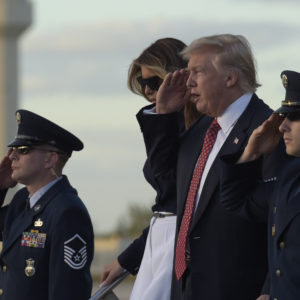The revelation that top Trump campaign officials were attempting to get dirt on Hillary Clinton from a Kremlin-connected lawyer may not complete the legal case on the campaign’s alleged collusion with Russia during the 2016 election, but it certainly smacks of disloyal conduct, if not legal treason.
This bombshell combines with the Rupert Murdoch-owned Wall Street Journal’s discovery that a Republican “opposition researcher” (a Washington euphemism for a digger of dirt on the opponent in a political campaign), with apparent connections with Trump campaign, was attempting to get Hillary’s emails from Russian hackers.
Perhaps also relating to the latter caper, the Journal also reported that U.S. intelligence picked up talk among Russian hackers that they needed to get such emails to then-Trump campaign adviser (and later national security adviser) Michael Flynn through an intermediary.
President Trump’s acknowledged attempt to shut down the FBI’s investigation into Russian hacking and collusion by firing FBI Director James Comey, whether legally meeting the standard of obstruction of justice or not, always led to the suspicion that such a brazen act might eventually lead the trail of collusion going from smoke to fire. With Trump campaign officials trying to troll for dirt on Hillary from a Kremlin-collected lawyer, the smoke just got much thicker.
The Trump campaign’s actions communicating with agents of foreign powers to obtain electoral advantage is already beginning to look like the Nixon campaign’s attempt to do the same during the 1968 election. Fearing that President Lyndon B. Johnson’s peace negotiations with the North Vietnamese to end the Vietnam War would help Democratic candidate Hubert Humphrey and therefore hurt Republican Richard Nixon’s chances in the election, Nixon sent a prominent Taiwanese envoy to the South Vietnamese to get them to nix any deal with the North. Nixon communicated through the intermediary to the South Vietnamese that he would give them a better deal if he got elected president.
Nixon’s treasonous act for his own gain was one of his worst transgressions in a sordid political career, because it prolonged the futile carnage of the Vietnam War. The ultimate ramifications of any Trump collusion with the Russians are still out. It will probably never be possible to prove whether any collusion converted a Trump election loss to a win, but flipping only 77,000 votes in three states is not that big a hill to climb.
And the embarrassing dump of opposition emails came at a critical time for the Trump campaign—just when an “Access Hollywood” recording surfaced of candidate Trump admitting that he committed the crime of sexually assaulting women. If the Trump campaign did collude with Russia for help in the astonishing election victory—now evidence certainly exists of attempted collusion — the actual historical effect depends on how bad Trump’s presidency becomes.
It is always possible that by some stroke of luck — and he has been lucky all his life, given that his past business practices would have landed mere mortals in the slammer — Trump will save his presidency, by escaping the collusion cloud, dodging the obstruction of justice rap, and benefitting from some national crisis that he can parlay himself into the country’s savior.
If presidential history is any guide, he might reap advantage even if a war or other crisis is of his own making. However, his unhinged behavior, willful ignorance of policy or even of how government works, and thus general incompetence mitigate against the probability of this outcome. Also, the biggest reason that Trump may fear a special counsel investigation is that his questionable past business dealings might be exposed.
The American electorate, or at least the 46 percent of it that voted for Trump, thought they were electing a businessman who would bring commercial acumen to shaking up the federal government and solving its myriad of problems.
Unfortunately, the Founding Fathers purposefully did not create the government to function like a family business, where a single patriarch is czar. (The world already had such monarchies or dictatorships.) Perhaps that’s why businessmen, such as Herbert Hoover and George W. Bush, haven’t traditionally had much success as president.
The Founders originally intended that the system of checks and balances would constrain the chief executive — in fact, designing the system so that Congress would be the dominant branch. Trump seems genuinely surprised that things don’t just happens as he commands.
Shaking up the U.S. government, which is much bigger and more dysfunctional than the Founders intended, counterintuitively requires a politician familiar with the system — but one who is disaffected with its direction and can implement proper policies to fix it.
Trump’s protectionist trade policies, discouragement of immigration, and tax cuts without likely spending reductions — all of which will likely harm the economy and country — are not the answer. Unfortunately, politicians with such qualities are rare and those that have them —for example, Ron Paul — are often rejected by the national electorate. Sad!

